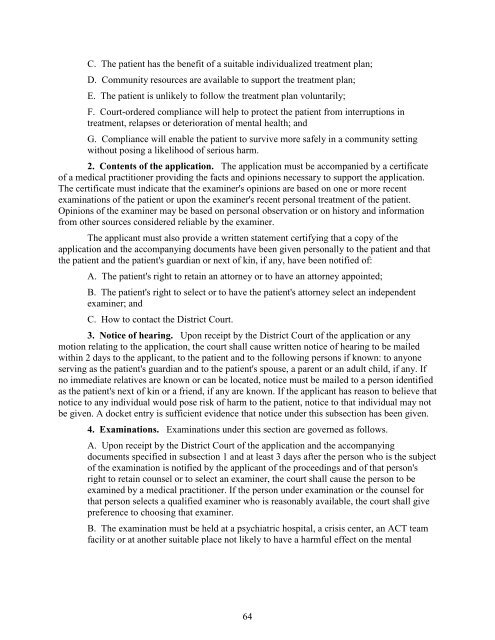involuntary hospitalization and outpatient services laws - Disability ...
involuntary hospitalization and outpatient services laws - Disability ...
involuntary hospitalization and outpatient services laws - Disability ...
You also want an ePaper? Increase the reach of your titles
YUMPU automatically turns print PDFs into web optimized ePapers that Google loves.
C. The patient has the benefit of a suitable individualized treatment plan;<br />
D. Community resources are available to support the treatment plan;<br />
E. The patient is unlikely to follow the treatment plan voluntarily;<br />
F. Court-ordered compliance will help to protect the patient from interruptions in<br />
treatment, relapses or deterioration of mental health; <strong>and</strong><br />
G. Compliance will enable the patient to survive more safely in a community setting<br />
without posing a likelihood of serious harm.<br />
2. Contents of the application. The application must be accompanied by a certificate<br />
of a medical practitioner providing the facts <strong>and</strong> opinions necessary to support the application.<br />
The certificate must indicate that the examiner's opinions are based on one or more recent<br />
examinations of the patient or upon the examiner's recent personal treatment of the patient.<br />
Opinions of the examiner may be based on personal observation or on history <strong>and</strong> information<br />
from other sources considered reliable by the examiner.<br />
The applicant must also provide a written statement certifying that a copy of the<br />
application <strong>and</strong> the accompanying documents have been given personally to the patient <strong>and</strong> that<br />
the patient <strong>and</strong> the patient's guardian or next of kin, if any, have been notified of:<br />
A. The patient's right to retain an attorney or to have an attorney appointed;<br />
B. The patient's right to select or to have the patient's attorney select an independent<br />
examiner; <strong>and</strong><br />
C. How to contact the District Court.<br />
3. Notice of hearing. Upon receipt by the District Court of the application or any<br />
motion relating to the application, the court shall cause written notice of hearing to be mailed<br />
within 2 days to the applicant, to the patient <strong>and</strong> to the following persons if known: to anyone<br />
serving as the patient's guardian <strong>and</strong> to the patient's spouse, a parent or an adult child, if any. If<br />
no immediate relatives are known or can be located, notice must be mailed to a person identified<br />
as the patient's next of kin or a friend, if any are known. If the applicant has reason to believe that<br />
notice to any individual would pose risk of harm to the patient, notice to that individual may not<br />
be given. A docket entry is sufficient evidence that notice under this subsection has been given.<br />
4. Examinations. Examinations under this section are governed as follows.<br />
A. Upon receipt by the District Court of the application <strong>and</strong> the accompanying<br />
documents specified in subsection 1 <strong>and</strong> at least 3 days after the person who is the subject<br />
of the examination is notified by the applicant of the proceedings <strong>and</strong> of that person's<br />
right to retain counsel or to select an examiner, the court shall cause the person to be<br />
examined by a medical practitioner. If the person under examination or the counsel for<br />
that person selects a qualified examiner who is reasonably available, the court shall give<br />
preference to choosing that examiner.<br />
B. The examination must be held at a psychiatric hospital, a crisis center, an ACT team<br />
facility or at another suitable place not likely to have a harmful effect on the mental<br />
64


